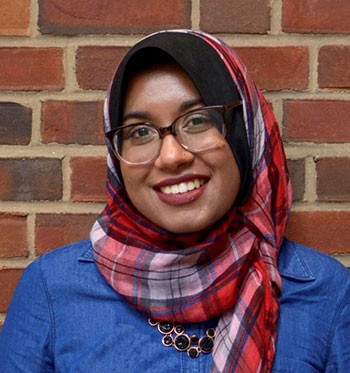Guest Blog: "We Are Columbia"
Samia Abedin (Columbia College '19), creator of "We Are Columbia" - a video challenging students to be uncomfortable and talk to each other, writes about her project.

My demanding schedule often leaves me exhausted after an entire day. But what I find even more exhausting is to be constantly surrounded by so many people on campus and yet, go the day without interacting with anyone. Because by not doing so, I rob myself from being able to connect with another. From conversing. From learning new things. From laughing. From growing. And spreading the positive vibes and energy I need to help others, and myself, make it through a long day. This is not to say that I have mastered the ability to initiate a conversation with anyone, because I have not. Like all, I certainly have my moments of feeling insecure, intimidated, or shy.
My project “We are Columbia” challenged me to be brave enough to conquer those feelings and start a conversation that matters with various students who I have approached in this video. The overwhelming sense of amazement and joy I felt in conversing with students about the importance in caring for one another quickly masked the awkwardness or discomfort it feels to approach someone new. It then almost became natural for me to walk up to somebody with a board and marker and ask them to write on what defines them.
A common need for compassion
Many students have found it very difficult to answer this question [what defines them], as I expected. We’re too unique, too rich, too complicated to be explained in one sentence. But upon participating, I watched as students smiled and laughed in front of the camera, proudly embracing their identity. If we shared more of these smiles and narrations of ourselves with others, and listened with empathy, I wonder the sense of belonging and community we’d be able to foster on our campus. On thinking about why students felt comfortable in daring to be vulnerable, it’s because we all share a common need for more love, laughter, compassion, and kindness. Students were moved by my using storytelling and narration as powerful markers for human connection and were inspired to create more meaningful interactions in their own lives.
Students were also very surprised that my project could have any relation to Contemporary Civilization (CC). But my professor encouraged us to think and act on how to better our Columbia community through the lens of our CC readings. And in doing so, I hope I was able to demonstrate against Rousseau’s belief that man in the state of nature is fully content because he has little contact with other humans. I argue the opposite; happiness is being socially connected.
People passing by are not strangers
As a native New Yorker, I can say with full confidence that it is not in us to engage in cordial small talk with strangers. Or make eye contact. And if the space allows, we like to stay far away from other people. We put on our headphones as means to signify that we’re shut off. Unavailable. Busy. We live a fast paced lifestyle here. Look forward and don’t turn back, we’re told from early on. Don’t pause, don’t reflect. Don’t wait for it, chase after it. Thus, it only makes sense that Columbia University, located at the heart of New York City, should be no different.
Except Columbia is different. Because the people passing by me are not “strangers,” but students and faculties who attend the same institution as I. And if we time it right and walk along the same route to our classes or eat at the same dining hall every day, then our faces are familiar to one another.
I don’t think anyone ever feels acknowledged enough. Make an effort to say hi to people and inquire about their day. Pay them a compliment. Meet new people. Make yourself uncomfortable. Make yourself available.
We all do better together
To me, the phrase “We are Columbia” means unity. We all do better when we work together, accept one another, and care for one another. And we can’t do any of this without first understanding one another and without first regarding one another as companions, than as competitors.
